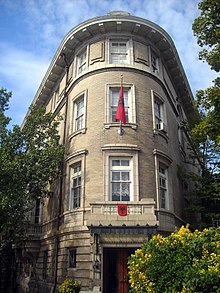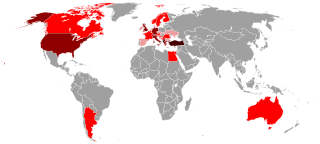
The Albanians are an ethnic group native to the Balkan Peninsula who share a common Albanian ancestry, culture, history and language. They primarily live in Albania, Kosovo, North Macedonia, Montenegro, Serbia as well as in Croatia, Greece, Italy and Turkey. They also constitute a large diaspora with several communities established across Europe, the Americas and Oceania.

Korçë is the eighth most populous city of the Republic of Albania and the seat of Korçë County and Korçë Municipality. The total population is 75,994, in a total area of 806 km2 (311 sq mi). It stands on a plateau some 12850 m (2,789 ft) above sea level, surrounded by the Morava Mountains.

The Albanian Air Force is the air force of Albania and one of the branches of the Albanian Armed Forces.
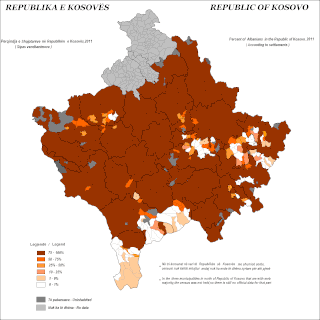
The Albanians of Kosovo, also commonly called Kosovo Albanians, Kosovan Albanians or Kosovars, constitute the largest ethnic group in Kosovo.
Albanian mafia or Albanian organized crime are the general terms used for criminal organizations based in Albania or composed of ethnic Albanians. Albanian organized crime is active in Europe, North America, South America, and various other parts of the world including the Middle East and Asia. The Albanian Mafia participates in a diverse range of criminal enterprises including trafficking in drugs, arms, and humans. Thanks to their close ties with the 'Ndrangheta of Calabria, they control a large part of the billion dollar wholesale cocaine market in Europe and appear to be the primary distributors of cocaine in various European drug hubs including London. Albanian organized crime is characterized by diversified criminal enterprises which, in their complexity, demonstrate a very high criminal capacity. In Albania, there are over 15 mafia families that control organized crime. According to some sources, Albania is the first European narco state.

In 1997, widespread civil unrest struck Albania due to economic problems in the country, that were caused by the collapse of Sali Berisha's pyramid schemes. Due to the large quantities of money robbed from the government to fund the schemes, the Democratic Party's government collapsed in January 1997. More than 2,000 people were killed in the conflict until its end in August 1997. The creation of a new government came as the revolutionaries surrounded Tirana. Various other sources also describe the violence that ensued as a rebellion or even a civil war.

The history of the Jews in Albania dates back about 2,000 years. According to historian Apostol Kotani : "Jews may have first arrived in Albania as early as 70 C.E. as captives on Roman ships that washed up on the country's southern shores... descendants of these captives that would build the first synagogue in the southern port city of Sarandë in the fifth century...[but] Little is known about the Jewish community in the area until the 15th century."
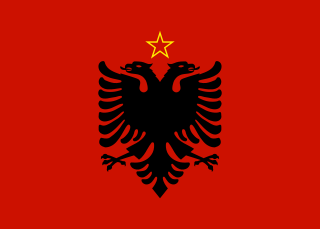
The People's Socialist Republic of Albania, officially the People's Republic of Albania from 1946 until 1976, was the one-party communist state in Albania from 1946 to 1991. It succeeded the Democratic Government of Albania (1944–1946).
Abaz Dilaver Çelkupa or Abaz Efendi Çelkupa was an Albanian politician and one of the delegates and signatories of the Albanian Declaration of Independence in 1912. He was among the key activists of the Albanian National Awakening.

The Albanian Basketball Federation is the governing body of basketball in Albania. It is based in Tirana, Albania. It organises the national basketball leagues of the Albanian Superliga, the First Division, the Albanian Cup and Supercup. Albania women's national basketball team, Albanian women's basketball league, Albanian Women's Cup and the Albanian Women's Supercup are also overseen. It also coordinates the activities of the Albania national basketball team and the Albania national youth basketball teams such as, Under-20, Under-18 and Under-16.

Posta Shqiptare is the national postal service of Albania. Posta Shqiptare sh.a. is a public limited company owned by the Albanian Government. As of 2017 its CEO was Laert Duraj.

Postage stamps from Albania are marked Shqiperia, Shqiperise and Shqiptare.
The People's Republic of Albania executed 22 intellectuals without trial on 26 February 1951, as ordered by Enver Hoxha. They were accused of bombing the Soviet embassy in Tirana. The victims were 21 men and 1 woman. One day earlier, Jonuz Kaceli was killed while accused of the same crime. It was the first time the Agitation and Propaganda law was used.

Durrës railway station is the main railway station serving the port city of Durrës in central Albania, the second most populous city of the Republic of Albania. It is located in the city centre, near the local port, at the intersection of Rruga Adria and Rruga Egnatia. There is also a station for intercity buses in front of the railway station building. The station is the hub of the Albanian railway network, and is connected by rail to other cities in Albania, including the capital of Tirana, Vlorë, Elbasan and Shkodër. It is located in the city centre, close to the Port of Durrës.
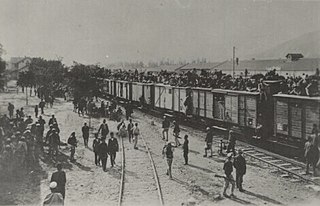
The Albanian revolt of 1912, was the last revolt against the Ottoman Empire's rule in Albania and lasted from January until August 1912. The revolt ended when the Ottoman government agreed to fulfill the rebels' demands on 4 September 1912. Generally, Muslim Albanians fought against the Ottomans then governed by the Young Turks, an aggressively nationalist revolutionary group, in the incoming Balkan War.

The Albanian Telegraphic Agency is the official multimedia news agency of the Albanian government. Its content is published in some of the main news agencies around the world of which it has contractual agreements with, such as: AFP, DPA, ANSA, Xinhua, Anadolu, etc. The agency is a member of the European Alliance of News Agencies (EANA), the Alliance of Mediterranean News Agencies (AMAN) and the Association of the Balkan News Agencies (ABNA).

Japan's ambassador in Rome is accredited to Albania, while an honorary consulate in Tirana assists Japanese interests in Albania.

Albania and Egypt have cordial and cooperative relations. Albania has an embassy in Cairo, and Egypt has an embassy in Tirana. Diplomatic relations between Albania and Egypt were established in 1958. Both countries are members of Organisation of Islamic Cooperation.
Albania has been a secular state since its founding in 1912, despite various changes in political systems. During the 20th century after Independence (1912) the democratic, monarchic and later the totalitarian communist regimes followed a systematic secularisation of the nation and the national culture. The Albanian understanding of secularism has strong influences from the French laïcité.
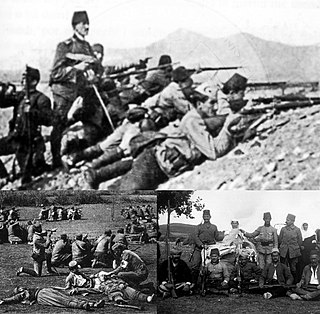
The Koplik War was a series of battles that occurred between Albania and the Kingdom of Serbs, Croats and Slovenes in 1920 and 1921.
